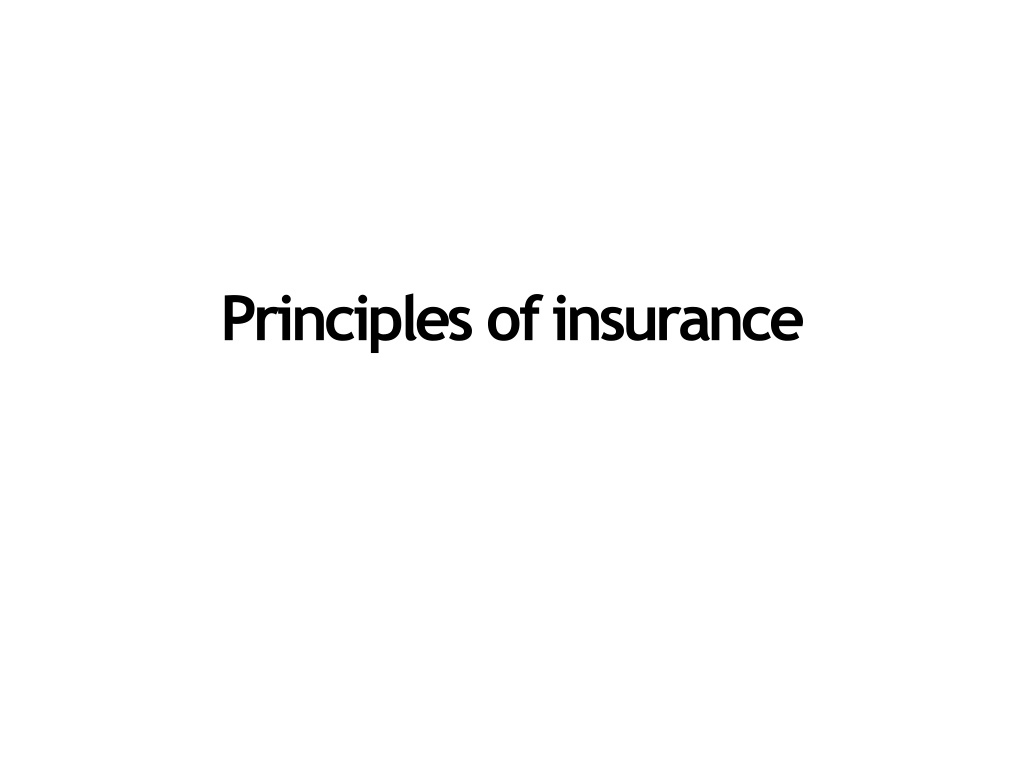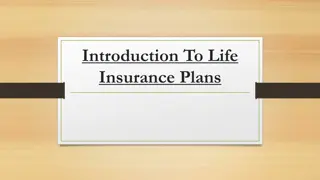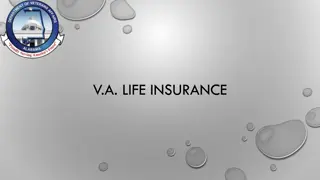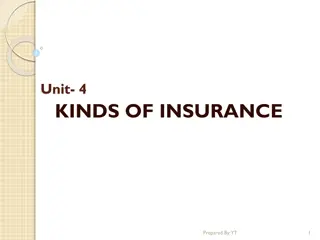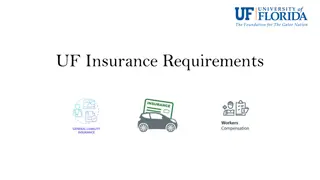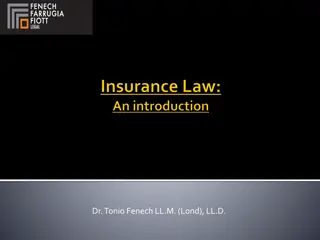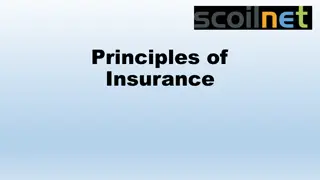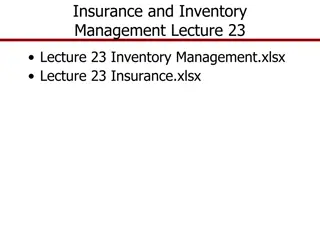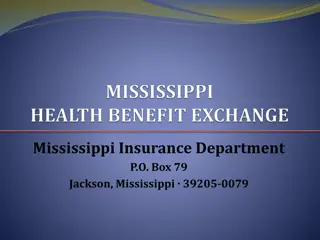Key Principles of Insurance
Understanding insurable interest, utmost good faith, and material facts disclosure are essential principles in the insurance industry. Insurable interest requires a financial stake in the insured property, utmost good faith mandates honesty in the contract, and material facts disclosure ensures all relevant information is shared. These principles form the foundation of insurance agreements, emphasizing trust and full transparency between insurers and policyholders.
Download Presentation

Please find below an Image/Link to download the presentation.
The content on the website is provided AS IS for your information and personal use only. It may not be sold, licensed, or shared on other websites without obtaining consent from the author.If you encounter any issues during the download, it is possible that the publisher has removed the file from their server.
You are allowed to download the files provided on this website for personal or commercial use, subject to the condition that they are used lawfully. All files are the property of their respective owners.
The content on the website is provided AS IS for your information and personal use only. It may not be sold, licensed, or shared on other websites without obtaining consent from the author.
E N D
Presentation Transcript
1) Insurable interest Insurable interest means that the person opting for insurancemust havepecuniaryinterest in the property heisgoingto get insuredandwill suffer financial loss on the occurrence of the insured event. Thisisoneof the essentialrequirements of any insurancecontract. Therefore, apersoncangofor insuranceof only those properties where he stands to benefit by the safety of the property, and will suffer loss, damage, injury if any harm takes place to such property.
Example If the house you own is damagedby fire, the value of your house has been reduced by the damages sustainedin thefire. Whether you pay to have the house rebuilt or you and up selling it at a reduced price. You have to suffered a financial lossresulting from thefire. By contrast, if your neighbor s house, which you do not own, is damaged by fire, you may feel sympathy for your neighbor and you may even be emotionally upset, but you have not suffered a financial loss from the fire, but in this example you do not have an insurableinterest in your neighbor shouse.
2) At most good faith Uberrima fides Almost goodfaith The insurance contract must be based on good faith. If the insurance contract is obtained by way of fraud or misrepresentation itisvoid. When an individual apply for life insurance, it is important to answer all questions truthfully and to volunteer any information even if not asked, if in doubt, just disclose it. Failure to disclose material factscould render the entire contract void.
Example If a person was suffering from sinusitis but did not discloseit, the entire contract couldbecancelledwhen the insurer discovernon-disclosure. Cancellationof the entire contract meansother non- related illnesses like cancer could no longer be covered. Some financial advisors who in their enthusiasm in closingthe saleadvicetheir clients not to disclosetheir pre-existing conditions for fear that the underwriter would reject thecase. Thereforeit isimportant to engageanethical financial advisor.T oavoidany conflict of interest, ensure you payafeefor consultation.
3) Material factsdisclosure In the insurance contract, the proposer is required to disclosureto the insurer all the material facts in respect of the proposed insurance. This duty of disclosingthe material factsnot only applies to the material facts which are known to him but also extends to material factswhich heissupposedtoknow.
Examples Acquisition of new companiesand/ormergers Changesto your businessdescription. Additional product lines and/or newservices Hazardous trade processes, or storage of hazardous matter, including changesor additons to processesor storagealreadydeclared Incidents not reported to insurers that might otherwise haveled to aclaime.gtheft or small fires.
4)Indemnity Theinsurancecontract shouldalwaysbeacontract of indemnity only andnothingmore. Insured can t make any profit from the insurance contract. Insurancecontract meansfor coverageof lossesonly. Indemnity meansaguaranteeto put the insuredin the position ashewasbeforeaccident. Thisprinciple doesnot apply to life insurance contracts. Themain object of this principle is to ensure that the insuredisnot ableto usethis contract for speculation or gambling.
5)contribution In case the insured took more than one insurance policy for same subject matter, he/she can t make profit bymakingclaim for samelossmore thanonce. For example: Rajhas a property worth Rs5 lakhs. He took insurancefrom companyAworth Rs.3lakhsand from companyB Rs1lakhs. In case of accident, he incured a loss of Rs.3 lakhs to the property. Rajcanclaim Rs3lakhsfrom companyA but after then he can t make profit by making a claim from companyB. NowcompanyAcanmakeaclaim from companyBto for proportional lossclaimvalue.
6)Subrogation What issubrogation? Subrogation is defined as a legal right that allows one party (e.g., your insurance company) to make a payment that is actually owed by another party (e.g., the other driver s insurance company) and then collect the money from the party that owes the debt after the fact. Subrogation is one of the ways that car insurance companies recover money that was paid out in claims to drivers insured by them.
How subrogationworks? Example: Supposeanother driver runsared light andyour caris totaled. You have insurance on your car, so you call your insurance carrier and they pay you for all of your expensesrelated to theaccident. Yourinsurance company realizing that the other driver had an insurance policy, then seeks reimbursement from the asfault party s insurancecarrier. Yourinsurer is subrogated to the rights of your policy and can step in your shoes to recover any amount paid out on yourbehalf.
Partial fault andsubrogation If the insurance company s investigation finds that you re partially at fault in the accident, the amount of the deductible youcanrecover will be prorated to the percentage of your fault. Example ifthe judgment isthat youwere 40 %of fault, for exampleandyourinsurer choosesto subrogate your claim, you ll be entitled to 60%refund of yourdeductible.
Waivingsubrogation If yousignanysettlement with other driver s insurance company,becareful to readthe fineprint. Some insurers attempt to insert a waiver of subrogation clause to prevent your insurance companyfrom attempting to get reimbursement for moneythat it haspaidout to you. If you waive subrogation after anaccident, your auto insurance company may refuse to pay your claim becausethey will not beableto seekreimbursement from the other driver s insurancecompany.
7) Lossminimisation This principle states that the insured must takeall the necessarystepsto minimizethe lossesto insuredassets. Forexample Ramtook insurancepolicy for hishouse. In an cylinder blast, his house burnt. He should have called nearest fire station sothat the losscould beminimised.
8) Causaproxima Word CausaProxima means NearestLoss Anaccident maybecausedby more than one cause. In caseproperty insuredfor only onecause.In such case nearest cause of the accident is fount out. Insurer paysthe claim moneyonly if the nearestcauseisinsured.
A Unit Linked Insurance Plan(ULIP) It is a product offered by insurancecompany that unlike a pure insurance policy, gives investors both insurance and investment under single integratedplan.
Reasons to have life insurance We list 10 compelling reasons for buying a life insurance policy. 1. LOOKING AFTER YOUR LOVED ONES EVEN AFTER YOU'RE GONE: This is the most important aspect of life insurance that one needs to factor in. Your family is dependent on you even after you're gone and you certainly don't want to let them down. Whether it's for replacing lost income, paying for your child's education or making sure your spouse get the much-needed financial security, life insurance could save the day for your surviving dependents. 2. DEALING WITH DEBT: You don't want your family to deal with financial liabilities during a crisis. Any outstanding debt-a home loan, auto loan, personal loan, or a loan on credit cards-will be taken care of if you happen to buy the right life insurance policy.
3. HELPS ACHIEVE LONG-TERM GOALS: Since it is an instrument that keeps you invested for the long term, it would help you achieve your long-term goals such as buying a home or planning your retirement. It also provides you with diverse investment options that come along with different types of policies. 4. LIFE INSURANCE SUPPLEMENTS YOUR RETIREMENT GOALS: Who wouldn't like their retirement savings to last until they do? With a life insurance plan, you can ensure you have a regular stream of income every month. Putting money in an annuity is like a pension plan- put in some money regularly in a life insurance product and enjoy a steady income every month even after retirement.
5. YOUNGER: Not every millennial needs a life insurance policy. If you haven't created an emergency fund or you're still living off your parents' money, insurance shouldn't be a priority. BUYING INSURANCE IS CHEAPER WHEN YOU'RE 6. YOUR BUSINESS IS ALSO TAKEN CARE OF: Life insurance isn't only for yourself and your family. Some insurance policies also take care of your business. If you own a business, then your business partner can purchase your portion of the business without hassle. Your business partner( s) will enter a buy-sell agreement and the payout would go to the deceased partner's nominees, but without giving them a stake in the company. There are two types of life insurance policies-a term insurance policy and a life insurance policy.
7. TAX-SAVING PURPOSES: You could save taxes with insurance policies irrespective of what plan you buy. The premium you pay on an insurance policy is eligible for a maximum tax benefit of Rs 1.5 lakh under Section 80C, and for tax-free proceeds on death/maturity under Section 10 (D) of the Income Tax Act, 1961. 8. A TOOL FOR FORCED SAVINGS: If you choose a traditional or unit-liked policy, you pay a premium each month, which is higher than what it costs to insure you. This bit of extra money is invested and it accrues cash value. This cash can then be borrowed against the policy or you can choose to sell it or draw income from it.
9. YOU MAY NOT BE QUALIFIED FOR IT LATER: Life insurance policies run on uncertainties. You may be healthy now and paying a premium for life insurance may seem to be an added financial burden, but if you suddenly fall ill, you may not be allowed to but a life insurance policy. Therefore, it is imperative to buy one early on in your life because it remains in force if your health deteriorates later on. Insurance companies allow you to attach certain riders or benefits to your existing or new policy. 10. PEACE OF MIND: Death is unavoidable. In the face of tragedy, the least you can do for your family is to secure their financial future. Even if it is a small policy, you know that you've done all you can to help them tide over difficult times.
Retirement plans As you retire, your monthly source of income comes to an end too. This may be a source of your worries and tension. But a life insurance will ensure that you have no worries as such. Helps to Buy various Options Life insurance helps you get great deals and profits through a vast number of policies. As you invest in those policies and finish the term, you get the benefits of it. Therefore, it is an instrument, which helps you invest for a long time and achieve your goals later on. A Savings Tool There is no doubt, life insurance acts as a tool and source for saving money. It is your real life piggy bank where you can add and invest in it, take up a variety of policies to secure your future and save the money lifelong. There are various policies, which will benefit you when you invest in them as early as possible. Hence, it is imperative that you buy such policies early in life.
